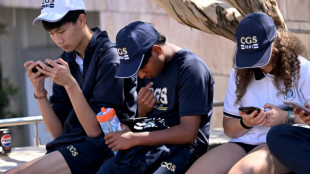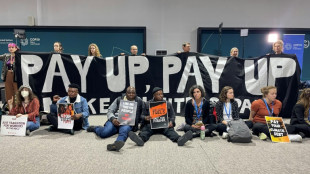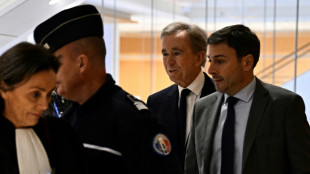
-
 Saudi Arabia hosts UN talks on drought, desertification
Saudi Arabia hosts UN talks on drought, desertification
-
PlayStation: Fun facts to know as Sony's console turns 30

-
 Nepal's first transgender candidates run for local office
Nepal's first transgender candidates run for local office
-
Father of PlayStation says 'everyone told us we would fail'

-
 Ireland seek to overcome former coach Schmidt's Wallabies
Ireland seek to overcome former coach Schmidt's Wallabies
-
Detroit survive Bears comeback to make it 10 wins in a row

-
 Mexican actor Silvia Pinal dead at 93
Mexican actor Silvia Pinal dead at 93
-
'Black Friday' deals target inflation-weary US consumers

-
 Liverpool look to deepen Man City crisis, Amorim seeks first Premier League win
Liverpool look to deepen Man City crisis, Amorim seeks first Premier League win
-
Police fire rubber bullets, tear gas at Georgia protesters after PM delays EU bid

-
 England lose three quick wickets in reply to New Zealand's 348
England lose three quick wickets in reply to New Zealand's 348
-
Social media companies slam Australia's under-16 ban

-
 Police fire tear gas at Georgia protesters after PM delays EU bid
Police fire tear gas at Georgia protesters after PM delays EU bid
-
Canada watchdog sues Google over 'anti-competitive' ad tech

-
 Hojlund gives Amorim winning Old Trafford bow, Roma hold Spurs
Hojlund gives Amorim winning Old Trafford bow, Roma hold Spurs
-
Amorim wins first Man Utd home game after rollercoaster ride

-
 France arrests 26 as South Asian migrant trafficking ring smashed
France arrests 26 as South Asian migrant trafficking ring smashed
-
At least 15 dead, 113 missing, in Uganda landslides

-
 Netanyahu threatens 'intensive war' if Hezbollah breaches fragile truce
Netanyahu threatens 'intensive war' if Hezbollah breaches fragile truce
-
Bilbao join Lazio at Europa League summit, Chelsea cruise in Conference League

-
 In Lebanon's Tyre returning residents find no water, little power
In Lebanon's Tyre returning residents find no water, little power
-
Protests in Georgia after PM delays EU bid to 2028

-
 Biden slams Trump tariff threats as 'counterproductive'
Biden slams Trump tariff threats as 'counterproductive'
-
TikTok tactics shake up politics in Romania

-
 'He should do comedy' says Norris of Verstappen comments
'He should do comedy' says Norris of Verstappen comments
-
Americans celebrate Thanksgiving after bitter election

-
 Flood-hit Spain introduces 'climate leave' for workers
Flood-hit Spain introduces 'climate leave' for workers
-
UK's Starmer vows to slash net migration

-
 Recount order, TikTok claims throw Romania election into chaos
Recount order, TikTok claims throw Romania election into chaos
-
Jansen stars for South Africa as Sri Lanka crumble to 42 all out

-
 Bottas set for Mercedes return as Mick Schumacher quits reserve role
Bottas set for Mercedes return as Mick Schumacher quits reserve role
-
Putin threatens Kyiv with new hypersonic missile

-
 Georgia delays EU bid until 2028 amid post-election crisis
Georgia delays EU bid until 2028 amid post-election crisis
-
French PM announces concession in bid to end budget standoff

-
 Guardiola's ingenuity will solve Man City crisis, says Slot
Guardiola's ingenuity will solve Man City crisis, says Slot
-
South Africa in control after Sri Lanka crash to 42 all out

-
 'Nothing left': Flood-hit Spanish town struggles one month on
'Nothing left': Flood-hit Spanish town struggles one month on
-
Israel conducts first strike on Lebanon since ceasefire

-
 'Unrecognisable' Mbappe and Real Madrid hurting after European woes
'Unrecognisable' Mbappe and Real Madrid hurting after European woes
-
Uber and Bolt unveil women-only service in Paris

-
 French cognac workers protest China bottling plan amid tariff threat
French cognac workers protest China bottling plan amid tariff threat
-
World tennis No.2 Swiatek accepts one-month doping suspension

-
 Suaalii to start for Wallabies against Ireland
Suaalii to start for Wallabies against Ireland
-
Farrell backs youngster Prendergast at fly-half for Aussie Test

-
 Suualii to start for Wallabies against Ireland
Suualii to start for Wallabies against Ireland
-
Camavinga joins Real Madrid injury list

-
 Australia passes landmark social media ban for under 16s
Australia passes landmark social media ban for under 16s
-
Nigerian president woos French investment on state visit

-
 Contentious COP29 deal casts doubt over climate plans
Contentious COP29 deal casts doubt over climate plans
-
PSG, Real Madrid toil as giants struggle to get to grips with new Champions League


A real gem: in Bahrain, only natural pearls will do
Customers at a Bahrain jewellery store study displays of pearls that are, unusually, 100 percent natural -- the result of attempts to preserve a centuries-old industry.
While rare elsewhere, natural pearls prised from seabed oysters by divers are the only variety produced in the Gulf kingdom, which is fiercely proud of its pearling tradition.
Bahrain, a tiny island state neighbouring Qatar, is the sole country worldwide to have banned the cultivation of artificial pearls, which have flooded the market since the 1920s.
"We can't mass-produce," said Faten Mattar, who works at the family-run jewellery shop.
It can take up to five years to complete one strand of a necklace by sourcing pearls directly from divers, she said, admitting it is "a challenge".
And larger pieces, which can go for up to $25,000, might take more than a decade to complete.
But with no two natural pearls identical, Mattar said that was part of the appeal.
"Each person... who owns or gets a piece of jewellery that contains natural pearls knows no one else has the same."
Mattar is one of the first women to work in a family business which was established more than two centuries ago, making it one of the oldest in Bahrain.
Pearls adorn bracelets, necklaces, cufflinks and other items in the small store.
"One of our goals... is to make pearls more attainable for everyone, so we created different lines instead of having just big pieces," she explained, mentioning designs for men and "daily jewellery for a younger crowd".
- Cultured 'shock' -
Like other Arab Gulf states, Bahrain's economy before the discovery of oil had relied on pearl harvesting.
Bahraini free-divers would spend months aboard traditional dhows, the wooden sailboats that have plied Gulf waters for centuries, to capture pearls prized by the region's royal families as well as European fashion houses.
But the natural pearl trade crashed after the Great Depression of the 1930s and the development in Japan of cultured pearls, artificially propagated in freshwater mussels, which are cheaper and easier to produce.
Muharraq, in Bahrain's north, is home to "the last remaining complete example of the cultural tradition of pearling", according to UNESCO, with a heritage site featuring oyster beds and a fortress where dhows used to set off.
Today, young gemologists at the Bahrain Institute for Pearls and Gemstones (DANAT) -- nestled among the capital Manama's skyscrapers -- scrutinise pearls using modern machinery or the naked eye.
One researcher passes a pearl through an X-ray machine under the watch of Fatima Almahmood, a graduate in physics and gemology.
The X-ray detects "growth lines" that distinguish natural pearls from cultured ones, she explained, pointing to an image of the scan projected onto a screen.
Created in 2017, DANAT appraises pearls at the request of merchants and individuals.
"You'd be surprised by how many clients come to DANAT that have inherited pieces and are then shocked to know... (they) contain cultured pearls," says Noora Jamsheer, who heads the research centre.
Apart from appraisal, DANAT also monitors conditions in the water where natural pearls are harvested.
Jamsheer said climate change is a cause for concern.
"We have a research team that is continuously going to the field, researching and collecting data -- the water temperature, water quality, salinity -- to determine and study the impact of these factors."
H.Seidel--BTB


